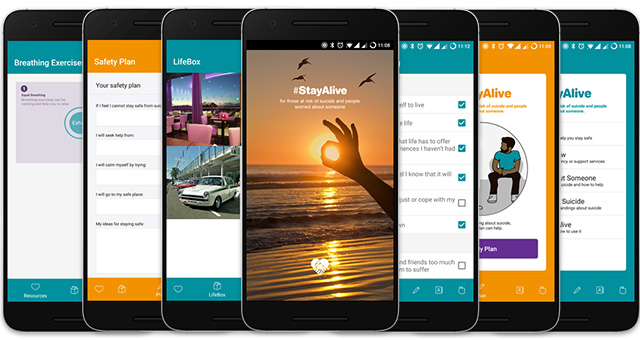Part
01
of one
Part
01
Depression Management and Suicide Prevention Apps
Some depression management and suicide prevention apps have incorrect or nonfunctional crisis hotline numbers. The presence of a functional crisis hotline number is an important yet lacking app feature. A study also reveals that gamification features may be included in depression management apps to increase user engagement. The pros and cons of some leading apps have been outlined below. These apps include MindDoc, What's Up, MoodMission, and Stay Alive. These apps don't have gamification features.
1. Incorrect crisis hotline numbers
- A study published in BMC Medicine reveals that there is a handful of depression management and suicide prevention apps that have unreliable or incorrect crisis hotline numbers.
- Experts have been worried that many mental health apps on Google Play and Apple App Store "may not be following best practices or connecting people with appropriate resources." The BMC Medicine study also reveals that most depression management and suicide prevention apps "didn’t include any applications aimed at health care providers, or that connected users directly to physicians or counselors."
- One of the advantages of depression management apps is the convenience and comfortability it provides for people to open up and share problems. However, the disadvantage is there's no set standard or regulation for these apps.
- According to Nadine Kaslow, Grady Health System's chief psychologist, "Incorrect or even harmful information could result in a very problematic outcome."
2. MindDoc has a library of courses and exercises
- MindDoc is a leading depression management app that has more than "3,000,000 downloads and 4.7 stars out of 26,000+ reviews." This app was "developed by clinical psychologists in close collaboration with leading researchers for those who want to learn about emotional well-being or who suffer from mild-to-moderate mental illness including depression."
- This app is free and it contains a library of courses, resources, and exercises that can help improve one's emotional well-being. MindDoc also provides insights into one's general well-being, behaviors, and symptoms. This app's credibility is a major advantage.
3. What's Up has a low credibility rating and unacceptable transparency
- What's Up is a free depression management app that provides helpful tools. It was designed using Cognitive Behavior Therapy (CBT) principles and it has features regarding "education about common thinking errors and various healthier alternatives; breathing techniques for relaxation; a guided grounding exercise; a log for tracking "good" and "bad" habits; a personal diary for recording thoughts and rating feelings; a "Catastrophe Scale" for gaining perspective on problems; open forums for discussion with other users; and a selection of positive quotes and other motivational material."
- Some disadvantages of What's Up include low credibility and unacceptable transparency. One Mind Psyber Guide gave this app a credibility rating of 1.67 out of 5.00, a user experience rating of 2.93 out of 5.00, and an unacceptable transparency rating. Its transparency rating was rated unacceptable because the app lacks a privacy policy.
- The app has a low credibility rating because it lacks the following: a research base, research independence and review, clinical input in development, and software updates. There is no scientific research regarding What's Up's effectiveness. The image below shows the app's user interface.
4. MoodMission has lots of activity suggestions but some are impractical
- MoodMission is a free app that's designed to help people who are experiencing depression. The app offers different activities or missions based on the user's feelings or mood at the moment.
- Based on the One Mind Psyber Guide, this app has a high credibility rating, 4.67 out of 5.00. Its user experience rating is 3.94 out of 5.00, and it has an acceptable transparency rating. The app has a privacy policy that describes the sharing procedures and information storage "related to user-entered information."
- According to Dr. Meredith Meacham, Assistant Professor at the University of California's Psychiatry Department, MoodMission has "lots of activity suggestions with accompanying explanations," but "several suggested activities may be impractical in certain settings or require advance planning."
- Also, one of the app's pros is it is password-protected, but one of the cons is the presence of sign-in issues. The app's user interface is shown below.
5. Stay Alive offers six suicide prevention strategies
- Stay Alive is a free app that was "developed by the United Kingdom-based Grassroots Suicide Prevention group" for suicide prevention. It is one of the few (7%) depression management and suicide prevention apps that offers six suicide prevention strategies. Some apps only offer two or three prevention strategies. This is also an award-winning app, and it is recommended by Sal McKeown of The Good Schools Guide.
- The six prevention strategies that are being offered by this app include the tracking of suicidal thoughts, the ability to establish a safety plan, the provision of recommended activities to deter thoughts, educational materials about suicide risk factors, the user's support network, and access to emergency counseling.
6. The use of persuasive system design features suggests improvement in app efficacy
- According to a 2021 study published in npj Digital Medicine, "Persuasive system design (PSD) is a framework that identifies four mechanisms through which app features increase user engagement: facilitating the primary purpose of the app, promoting user-app interactions, leveraging social relationships, and increasing app credibility." This 2021 research study is entitled, "Smartphone apps for depression and anxiety: a systematic review and meta-analysis of techniques to increase engagement."
- The study reveals that a barrier to the real-world efficacy of depression management apps is the "lack of sustained user engagement." This may also be a potential area of innovation. The study states, "understanding the extent to which the engagement features of PSD techniques, behavioral economics, and/or gamification translate into improvements in engagement and mood outcomes may inform the development and deployment of more efficacious apps for anxiety and depression."
- The study also states that "gamification features, including points, badges, levels, and avatars, are used to increase engagement and may enhance apps' intended effects."


